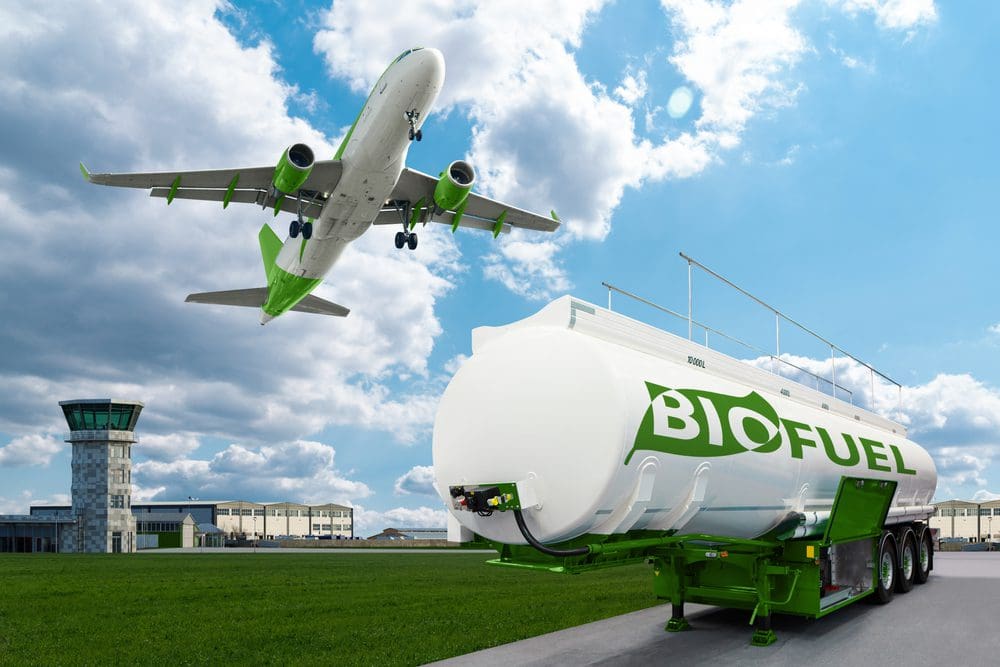We all know we need to change out travel habits to help deal with greenhouse gas emissions and save the environment.
But encouraging a reduction in air travel is a tough sell to a global population now so used to being able to jet around the world for business or pleasure.
Which presents a challenge. If people will not reduce their desire to board a plane, how can the environment-harming CO2 emissions released by aircraft be reduced?
Introduction to SAF
Enter sustainable aviation fuel (SAF).

It, as the name suggests, promises an alternative fuel to the conventional fossil-based aviation fuel.
By using everything from cooking vegetable oil to plant oils, to agricultural residues and waste gases, the ambition is to provide a fuel which does not require any damage to the environment like fossil fuels.
According to a report by Transparency Market Research earlier this year, the SAF global market was worth $186.6 million in 2021 but forecasts it will reach $402 billion by 2050.
It added: “It is anticipated that use of sustainable fuels would increase as several governments are pushing sustainable growth in different industry verticals.”
The sector is taxiing, ready for take-off.
Funding into the SAF sector
To underline the sort of money being pumped into the sector, Breakthrough Energy, which supports cutting-edge research and development, recently announced the first recipient of its Catalyst funding will go to LanzaJet’s Freedom Pines Fuels SAF plant in the US.
The $50 million grant will go toward the firm’s first commercial-scale SAF plant and will be the first in the world to produce what is known as alcohol-to-jet SAF. It claims it is a “proven solution for commercial production of both SAF and renewable diesel” and which will lower emissions by 70% compared to fossil jet fuel.
Once fully operational, the plant will allow it to scale SAF production and bring sustainable lower-cost aviation fuel to market.
Crucially, the SAF market has the support of the major aviation sector airlines in the – all keen to reduce their carbon footprint while not being forced to send prices soaring.
Earlier this year saw the launch of the United Airlines Ventures Sustainable Flight Fund. Billed as a ‘first-of-its-kind’ investment vehicle, it is designed to support start-ups focused on decarbonising air travel by “accelerating the research, production and technologies associated with SAF”.
To kick-start the fund, $100 million was invested by United and its inaugural partners, which included the likes of Air Canada, Boeing, JPMorgan Chase, Honeywell and GE Aerospace.
United CEO Scott Kirby said:

“Solving climate change is doable but it requires hard work and real leadership. This fund is unique. It’s not about offsets or things that are just greenwashing. Instead, we’re creating a system that drives investment to build a new industry around sustainable aviation fuel, essentially from scratch. That’s the only way we can actually decarbonise aviation.”
In the past two years alone, United Airlines Ventures has invested in start-ups such as Cemvita, Dimensional Energy, and NEXT Renewable Fuels.
Its investment in Houston-based Cemvita – a joint deal it announced with Oxy Low Carbon Ventures – will see it push ahead with plans to commercialise the production of SAF through a new process using carbon dioxide (CO2) and synthetic microbes.
United is also an investor in start-up Alder Fuels from which it has a purchase agreement to buy 1.5 billion gallons of SAF over the next 20 years.
Alder has secured a grant award of $2 million from the US Department of Energy – its third award – to support the engineering design of the company’s first demonstration-scale plant.
SAF Potential Hurdles
But while there’s plenty of money being pumped into the aviation industry, there are stumbling blocks to its full take-off.
Currently, SAF is considerably more expensive than regular jet fuel – at least double the cost – while supply is also limited. Hence the funding for scalable projects.
That is absolutely key to unlocking its potential.
However, with the aviation sector committed to net-zero carbon emissions by 2050, progress is essential – offering plenty of options for savvy investors.
Further sign of the industry’s commitment comes from the World Economic Forum’s Clean Skies for Tomorrow Coalition.
It includes a host of the world’s biggest airlines and has set a target of 10% SAF adoption by 2030.
US-based start-up Air Company last year signed multi-year agreements to sell SAF to carriers JetBlue Airways Corp and Virgin Atlantic.
Virgin’s deal alone committed it to purchase 100 million gallons over 10 years.
Air Company, which last year successfully concluded a $30 million Series A funding round, will use carbon dioxide from the atmosphere to create its fuel – turning a pollutant into a useful resource.
It has also agreed a deal with Boom Supersonic – the company aiming to relaunch supersonic flight back to the skies by 2029.
The demand and appetite is clearly there.
There are alternatives too to reaching that net-zero target.
UK-based ZeroAvia is developing a hydrogen-electric engine for jets. Founded in 2018, it has since secured more than $160 million from investors. It has deals in place with a number of airlines.
It plans for its first up to 20-seat, 300 mile-range commercial offering to be in the sky by 2025 – with 200-seater flights, with a range of 3,000 miles, by 2032.
Conclusion
There is a need. There are tried and tested options. There is a commercial appetite. Sustainable aviation fuel – in whatever form proves the most abundant and commercially viable – is the future for commercial airlines. Backing the right horse in the race to become a significant player in the sector is the challenge facing investors – and there are plenty of options.
Companies to Watch
Air Company, ZeroAvia, LanzaJet, Alder Fuels, Cemvita, Dimensional Energy, NEXT Renewable Fuels








